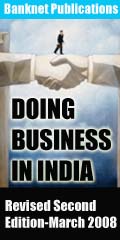|




|
Budget 09 is likely to boost consumer demand by Income Tax exemptions, says ASSOCHAM
Finance Minister, P Chidambaram, is likely to enhance the income tax exemption limits in the backdrop of impressive rise in the tax revenues and the necessity to give boost to consumer demand which needs to be insulated from the global slowdown, over 90 per cent of the CEOs Surveyed by ASSOCHAM on their Budget expectations revealed.
Unlike the last year when the income tax exemption limit marginally increased by Rs.10,000, from Rs.1 lakh, CEOs expect significant hike in threshold for all classes of the assets including women and senior citizens, according to a Survey of 185 CEOs by the ASSOCHAM Business Barometer (ABB).
Commenting on the analysis, the ASSOCHAM President, Mr. Venugopal N. Dhoot said that the rise in tax exemption limits may be accompanied by rejig in the income tax slabs. At present, the income up to Rs.1,10,000 is exempted from income tax incase of individuals while the exemption limit is Rs.1,45,000 in case of women and Rs. 1,95,000 in case of senior citizens.
While the CEOs wanted 30 per cent corporate tax slab should start only from Rs. 5 lakh income, they felt that Budget may not be that generous given the fund requirement for various social sectors in the last year of the government. However, 72 per cent of them were expecting rejig in the tax system in the coming Budget. Dr. C Rangarajan, Chairman of the Economic Advisory Committee to Prime Minister, has also suggested that the slab should be reworked.
86 per cent of the corporate heads said that there was a case for reduction in the corporate tax rate in the wake of buoyancy in the tax collections. 79 per cent said that this will not affect the revenue generation, rather enhance the compliance rate.
About 83 per cent of the corporate heads saw least chances of reduction in the peak customs duty as the imports have already become cheaper on account of 10 per cent appreciation in the Rupee against dollar since last year’s budget. However, the Budget is expected to correct the inverted duty structure.
Certain manufacturing sectors like color TVs, tyres, chemicals, textiles face the problem of inverted duty structure wherein the custom duty on raw material is higher than the rate applicable on the import of finished products.
Most of the survey respondents were confident of higher budgetary allocations for the social sectors like education, health and rural development.
With the upward pressure on the global prices of crude oil, resulting into huge losses for the oil companies in India and potential of increasing the inflation rate, the industry leaders are expecting restructuring in the tax structure imposed on the import and refining of oil. 78 per cent of them stated that the finance minister may reduce the customs duty on import of crude oil and products from present 5 per cent to 2.5 per cent. There are chances of rationalization in the excise duty on petrol and diesel.
The Budget proposal for the fiscal 09 may give boost to the consumer durables sector whose production has declined by 1.3 per cent in April-December 07 as compared to healthy 11.2 per cent growth last year. 76 per cent of the ABB respondents were anticipating reduction in the excise duty from 16 per cent to 12 per cent.
Majority of the corporate heads expressed the likelihood of slashing of excise duty on two and three wheeler segment in the auto sector which taken a sever hit due to high interest rates. The sector has been posing negative growth of around 7 per cent during April-December 07. The present rate of excise rate on consumer goods is around 16 per cent.
Textile industry would get adequate incentives in this year’s Union Budget as the sector is hit due to increased competition in the export market due to currency appreciation. This has resulted into closing of many textile units and unemployment of the workers engaged in the sector.
According to the 89 per cent of the CEOs, the government is most likely to announce sops for the industry. This may include reduction in the basic excise duty on textile machinery and equipment from 16 per cent to 8 per cent and extension in the exemptions enjoyed exclusively by export oriented Units (EOUs) to other manufactures. Also, the budget allocation under technology Upgradation Fund Scheme (TUFS) and Scheme for Integrated Textile Park Scheme (SITP) may rise.
(This is the press release of Assocham)
Budget balances growth objectives within current political compulsions, says FICCI... Click here
Growth and Inclusiveness: FM Provides the Right Balance:CII.. Click here
Budget will Boost Social Sectors, Revive Farming, Industrial Growth, Says IMC ... Click here
IT-BPO industry including Nasscom disappointed with the Indian Union Budget 2008 ... Click here
For full text of Indian Union Budget 2008-09... Click here
For more IT & BPO stories... Click here
CLICK FOR MORE FEATURES & STORIES
|
|


|







